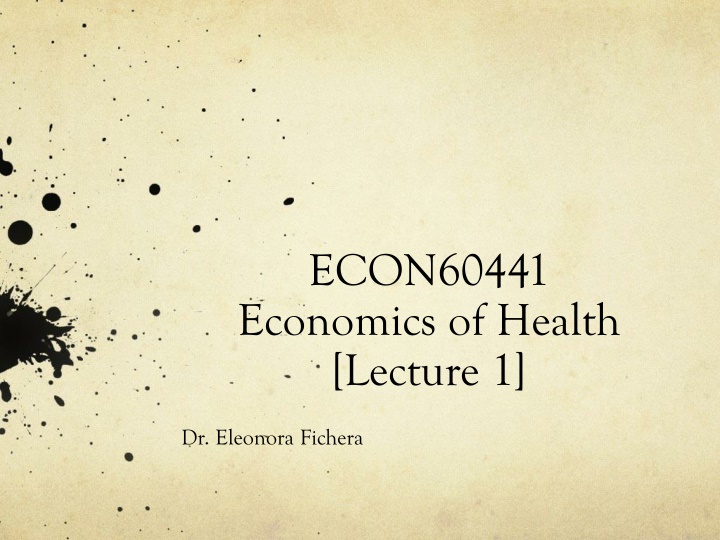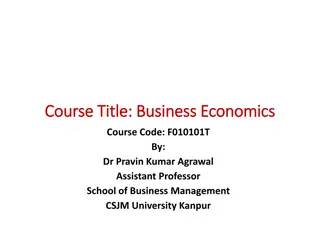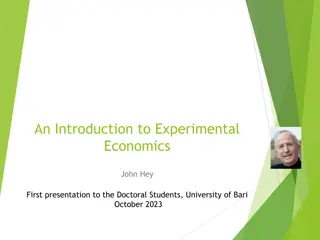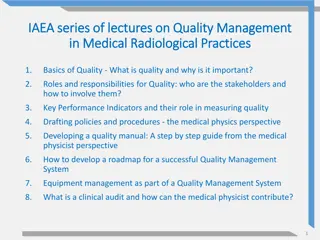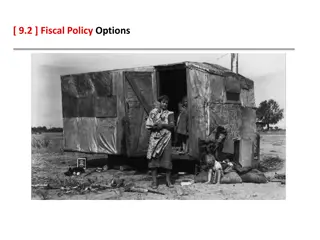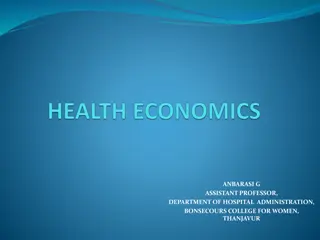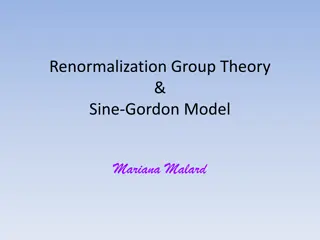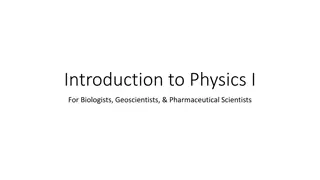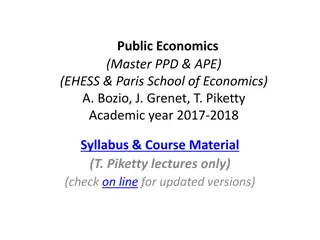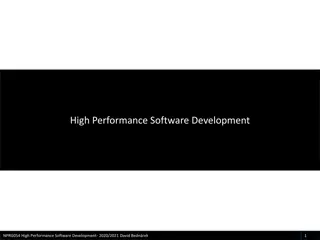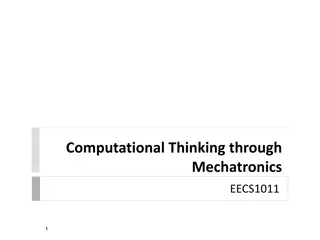Economics of Health: Course Details and Lectures
Dive into the world of Health Economics with a comprehensive course covering demand and supply aspects, theoretical models, empirical studies, and economic evaluation. Explore topics such as the microeconomic principles of health production/consumption, public financing of healthcare, incentive systems design, and methods of measuring life value. Engage with knowledgeable lecturers and valuable resources to deepen your understanding of the economic aspects of health and healthcare systems.
Download Presentation

Please find below an Image/Link to download the presentation.
The content on the website is provided AS IS for your information and personal use only. It may not be sold, licensed, or shared on other websites without obtaining consent from the author.If you encounter any issues during the download, it is possible that the publisher has removed the file from their server.
You are allowed to download the files provided on this website for personal or commercial use, subject to the condition that they are used lawfully. All files are the property of their respective owners.
The content on the website is provided AS IS for your information and personal use only. It may not be sold, licensed, or shared on other websites without obtaining consent from the author.
E N D
Presentation Transcript
ECON60441 Economics of Health [Lecture 1] Dr. Eleonora Fichera
Some admin stuff Course structure and contributors Tutorials Blackboard Office hours Textbooks and Evaluation
Course Structure and contributors Two parts: Demand for health: Dr. E. Fichera Supply of health: a) Theoretical models: Dr. M. Pezzino b) Empirical applications: Dr. S. Nikolova Textbooks: Demand for health: Zweifel et al. (2009) and reading list Supply of health: Zweifel et al. (2009) and reading list
Lectures Date Lecturer Tutorial Demand for health 1. What is the Economics of Health? 02/10/2013 Dr. Eleonora Fichera (EF) 2. Microeconomic principles of production/consumption of health (i) 09/10/2013 Dr. Eleonora Fichera 3. Microeconomic principles of production/consumption of health (ii) 16/10/2013 Dr. Eleonora Fichera 16/10/2013 (EF) 4. Empirical studies on the production of health 23/10/2013 Dr. Eleonora Fichera 23/11/2013 (EF) Supply of health 5. Public financing and provision of healthcare 06/11/2013 Dr. Mario Pezzino (MP) 6. Microeconomic analysis of the design of incentive systems (theory, i) 13/11/2013 Dr. Mario Pezzino 7. Microeconomic analysis of the design of incentive systems (theory, ii) 20/11/2013 Dr. Mario Pezzino 20/11/2013 (MP) 8. Microeconomic analysis of the design of incentive systems (applied) 27/11/2013 Dr. Silviya Nikolova 04/12/2013 (SN) Economic Evaluation 9. Measuring and valuing life 04/12/2013 Dr. Mark Harrison (MH) 10. Methods of deciding what is provided 11/12/2013 Dr. Mark Harrison 11/12/2013 (MH)
Office hours and Evaluation Office hours: i) Dr. E. Fichera: by appointment. Office: 4.320 Jean McFarlane Building (Behind University Place) eleonora.fichera@manchester.ac.uk ii) Dr. M. Pezzino: Mondays: 14.00-16.00. Office: 2.013 Arthur Lewis Building mario.pezzino@manchester.ac.uk iii) Dr. S. Nikolova: by appointment. Office: 4.305 Jean McFarlane Building (Behind University Place) silviya.nikolova@manchester.ac.uk iv) Dr. M. Harrison: by appointment. Office: 1.304 Jean McFarlane Building (Behind University Place) silviya.nikolova@manchester.ac.uk Evaluation: a) Midterm Essay: 30% by 4thNovember b) Written Exam: 70%
What is Economics? Economics is a social science concerned with studying the behaviour of economic governments) when confronted with scarcity. o agents (people, firms, Economics analysis focuses on decisions and choices about production and consumption of economic goods. o These are goods or services that are scarce relative to the society s wants for them. o
What is Health Economics? Health Economics is the discipline of economics applied to the topic of health . Economics of health is the study of choice making on health by individuals, institutions, societies, nations and world under conditions of scarcity But is it Health Economics, or Health care economics or Economics of Health? Distinction between demand for health (microeconomic view) and demand for health care (macroeconomic view).
The birth of Health Economics Arrow (AER, 1963): Uncertainty and welfare economics of medical care . Role of market/non-market institutions in provision and distribution of health care services. Grossman (JPE, 1972): On the concept of health capital and the demand for health . Role health as human capital model Health as durable capital stock, depreciates with time and can be augmented with investment
Current research Split between the two in 1970s NBER two programs: i) Health Economics Program (M. Grossman) on economics of obesity, substance use, role of schooling, unemployment etc. ii) Health Care Program (A. Garber) study of health care organisations, price competition between providers etc.
Economics of Health vs. Economics of Health care Economics of Health: Production of Health Normative: Valuation of health in monetary terms i.e. the weighing of good health vs. consumption of other goods. Positive: Individual health behaviour using microeconomic theory i.e. utility maximisation where utility depends on health. Economics of Health Care: Demand for Medical Services Normative: Conditions of (efficient) production/distribution of medical services taking scarcity of resources into account. Positive: Determinants of the quantity/quality of medical services produced in a society.
Some examples Economics of Health: From an individual s point of view, what are the conditions which determine the optimal resource allocation between health and other goods? Are individuals rational in choosing health or are preferences inconsistent leaving medical experts to decide preventive measures? Can the economic concept of substitution be applied to health production with regard to individuals own health-enhancing efforts? Economics of Health Care: How do governments determine an optimal resource allocation for the provision of health care services? What are the incentive effects of alternative payments systems for physicians and hospitals?
Structure of the course A system analysis of the Economics of Health and Health Care
What is Health? The World Health Organisation (WHO) defined health in its broader sense in 1946 as a state of complete physical, mental, and social well-being and not merely the absence of disease or infirmity . Health is a highly valued asset. Other assets are often ranked lower in the preference scale of most people. Health is a prerequisite for other activities. Poor health limits the production capabilities of an individual. Health is both a consumption and a production good. We derive utility from health but we also produce health!
What makes Health different? Lack of control. The process of producing health lacks of the control that other activities have. Lack of tradability. The output of the production of health cannot be sold to a third party. BUT Re lack of control: we can affect the probability of good health in a similar way a farmer affects the yield of harvest against the odds of weather Re lack of tradability: we do trade health against other goods such as tobacco or alcohol consumption. Health can be thought as invisible capital stock just like education
Microeconomic view of Health Consumption and production of health: an economic approach.
Policy Implications Preferences between Health and Consumption may change (i.e. information, health shocks) Quadrant I The relation between consumer goods and consumption services may be modified by innovations in household technology (i.e. saving time) or improved education (i.e. more information on consumer goods) Quadrant II The budget constraint is subject to changes (i.e. income benefits, taxation) Quadrant III The relation between use of medical services and health status is also modified by technological changes in medicines (i.e. new capital technology), by environmental factors (i.e. pollution) or by increase/decrease of health-enhancing efforts of individuals (i.e. more information on lifestyle behaviours) Quadrant IV
References Health Economics P. Zweifel, F. Breyer, M. Kifman, Springer, 2ndEdition, 2009. Chapter 1. Health economics of health care economics? C. Cardoso (2008), Polytechnical Studies Review, Vol. VI, No.10: 189-198. Uncertainty and the Welfare Economics of Medical Care K. J. Arrow (1963), The American Economic Review, Vol. 53, No. 5, pp. 941-973 On the concept of health capital and the demand for health M. Grossman, The Journal of Political Economy, Vol. 80, No. 2, pp. 223-255.
